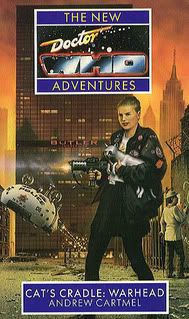
Cat's Cradle: Warhead (1992)
Although why they put the "Cat's Cradle" bit on is a mystery since other than a very brief appearance from the silver cat this has almost no connection to the previous book.
In brief: Set in The Future of the Early-21st Century, the world is an ecological disaster controlled by the mega-wealthy and their multinational corporations. The streets are filled with violent youths who spend most of their time when not committing crimes playing violent video games. Still no flying cars (ignore the cover).
So it totally missed the mark.
Oh...
Andrew Cartmel is a strange figure in Who-dom. As script-editor during the last 3 years of the original run he either (according to fandom) A) Turned the show into a confused mess which deserved to be taken off-air or B) Dragged the show kicking and screaming out of the mid-80s doldrums and reignited its creative embers (albeit too little too late).
BTW, the correct answer is B. A is only believed by poor sad deluded people who think that the plot of every story should be a variation on The Invasion.
But here we have Cartmel's chance to write 100% unbridled Doctor Who as he wanted it. The result is amazing. It's been stated by Cartmel several times that one of his drives during his time on the show was to try to put more mystery back into the character of the Doctor. Here we see the total realisation of that desire as the Doctor is alien and totally the outsider. This is achieved subtly by never allowing the reader to be privy to the character's inner thoughts or feelings. He's only ever seen through the eyes of others.
Also the Doctor is absent for large parts of the narrative and the result is a much more interesting and textured version of the character. It's one I had no problem in picturing McCoy playing, which was not something I could always do for the previous NAs.
So with the Doctor kept somewhat in the background it's left to Ace carry the story as she globe-trots on his instructions. The mission as it turns out is stop a rich businessman from putting the minds of humanity into a giant computer so that he can live forever and escape the effects of the choking Earth (with the minds of the rich to go in first of course). And it's not pretty as she has to deal with murderers, arms-dealers and other psychotics. The book has some rather shocking violence which shows both how bold the book series was, but also I think how little attention the BBC was spending at the time on anything with the Who logo. Ace is forced into situations that would be unthinkable on television. I can't quite picture the these-days the BBC allowing Amy or Rose to have to struggle to the death with a murderous arms-dealer.
Catherine Tate on the other hand...
Cartmel has some very strong political views that he's not scared to share. We're talking about a man who only half-jokingly claimed during his job interview for Doctor Who that he'd like to use the show to bring down the Government (The Happiness Patrol as wish-fulfilment?). So unsurprisingly we have the Doctor as somewhat of an anarchist/anti-authoritarian, fighting against those who want power at the expense of others. The first chapter sets this up well as the Doctor helping a child to make a sling-shot in order to destroy a security-camera. It's an aspect of the character I'd like to see come back more strongly in the series.
I'd pay good money to actually hear The Doctor refer to a fire-bombed McDonalds as a "de-consecrated church" as he does here.
While writing a novel set in the near future is always tricky, and considering that we're now in The Future that the book is set (while no date is specified it's clearly meant to be somewhere between 2005-2020), many of the "futuristic" aspects are frighteningly accurate (barring a notable absence of cell phones and the presence of video games played with VR helmets). The power of corporation, an interconnected and monitored society and a world where the majority of workers are forced to suffer due to fear of losing their jobs/health-benefits all ring far too true today. It's not like those issues weren't around back in 1992, but what's put in the book as an extreme seems almost normal now.
So to sum up this is definitely the best of the books so far, and it will take a lot for (IMHO) other novels in the series to match Warhead. It really highlights how far the format/concept of the program can be stretched but still undeniably be Doctor Who.
No comments:
Post a Comment